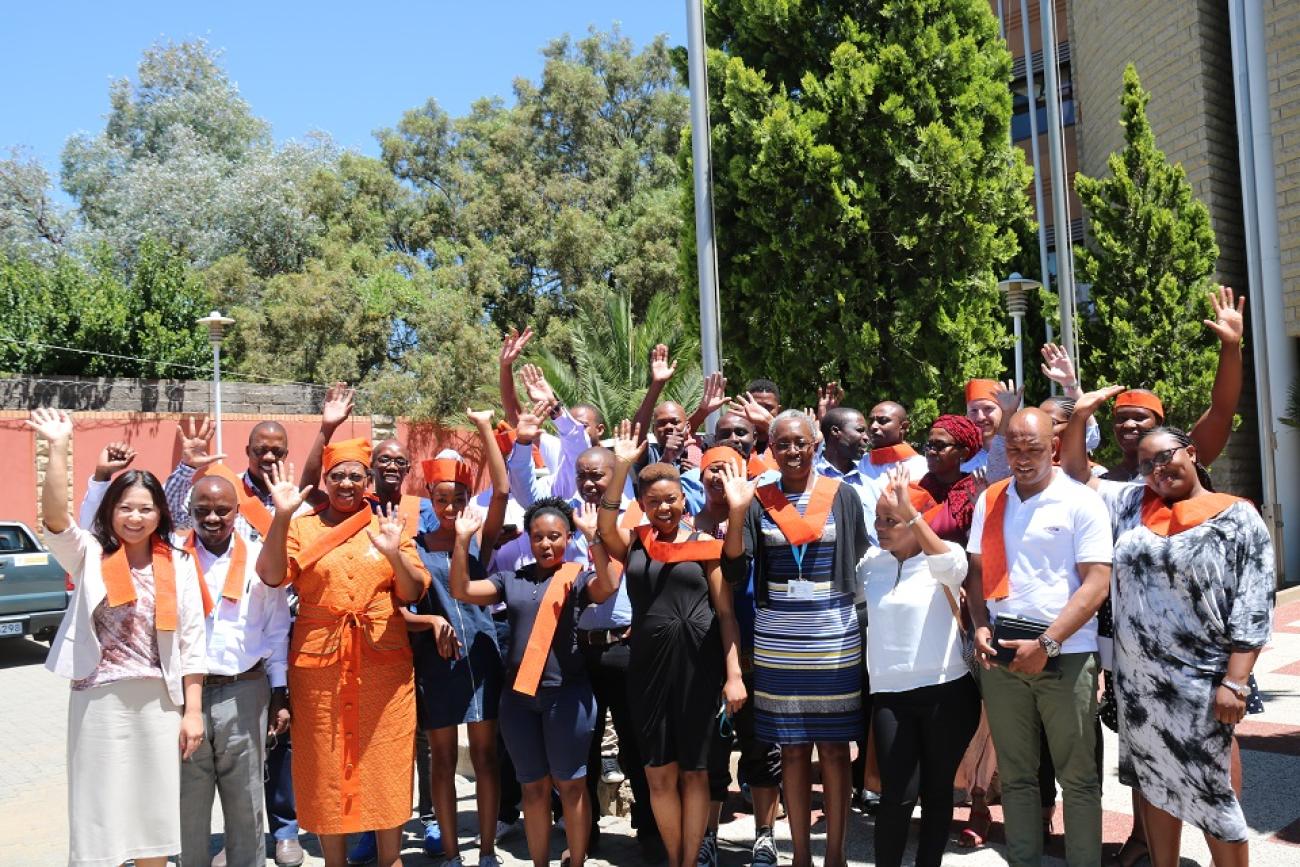Innovations Against Gender Based Violence

Gender-based violence (GBV) undermines the health, dignity, security and autonomy of its victims, yet it remains shrouded in a culture of silence.
Especially Violence against women and girls is one of the most prevalent human rights violations in the world. It knows no social, economic or national boundaries. Worldwide, an estimated one in three women will experience physical or sexual abuse in her lifetime.
As part of the 16 Days Activism against Violence Against Women and 100 Days of Innovations announced by the UN Lesotho Resident Coordinator, the UN System to the Kingdom of Lesotho organized a technical meeting on Innovations against GBV with participation of CSOs, youth, private sector, media, academia and UN agencies on Friday, 2nd December, 09:00-11:00, at the UN Conference Hall.
The meeting started with opening remarks by Ms. Roselidah Ondeko, UNFPA OIC, and Ms. Matau Futho Letsatsi, Director of Gender of the MoGYSR, both addressing the importance of tackling GBV for social and gender based equality as well as for economic reasons. Following their remarks, brief presentations on global and national data on GBV, and on innovative ideas against GBV were given to quickly dive into the group work on the broader topic of Innovations against GBV. By identifying challenges in the fight against GBV and through grouping the participants in thematic areas, participants worked on “What innovative solutions we can bring forward to address GBV and efforts to respond. What partnerships and support is needed?”.
Four key areas in the fight against GBV were identified. Following are the main discussion points and possible key areas for bringing innovative change:
Social and cultural norms:
- Initiation schools can serve as key entry point in addressing GBV by targeting instructors and train them in life skills and impacts of GBV;
- Village chiefs can be used to generate a culture of changing mind sets towards the protection of girls and women;
- Identification of men / women role models in the community can further serve the above;
- Initiate public dialogues at different levels of society with survivors of GBV. Include violated people in the process of bringing change as referred to by the “Nothing about us without us” agenda;
- Bringing about social change by promoting gender responsive cultures and traditions (cultural education);
- Introducing gender studies and gender sensitive programmes into the various stages of life – from early childhood by sensitising parents to institutions of higher learning / education.
Advocacy and awareness raising:
- Advocate for safe reporting systems, awareness of such and advocate for the enforcement of existing laws;
- Increase the advocacy capacity of GBV related organisations and lobby for a gender related movement;
- Have standardized GBV messages delivered by key stakeholders, such as churches, chieftainships, schools, political parties etc;
- Create virtual support centres and embed GBV messages in different telecommunication companies (hotline; quizzes; promotion of products);
- Introduce competitions that are GBV focussed;
- Introduce gender based clubs in schools and communities.
Research, monitoring and reporting
- Research:
i. Surveys: periodic, general, specific;
ii. Mapping data collection (institutions), networking for partners involved;
iii. Research on emerging GBV issues / specific groups;
iv. Cost efficiency studies on GBV (similar to the COHA report)
- Monitoring:
i. Integrated digital reporting systems with a referral system to dissemination and reporting of GBV incidents;
ii. Developing of preparedness plans through data generated;
iii. Routine data collection (data hubs / points)
- Dissemination of Data and reporting:
i. Documentation of good practices;
ii. IEC materials;
iii. Public gatherings;
iv. GBV message in market products, TV, Radio and Social Media
These three areas are interconnected and build on each other. Referral systems should be in place and generate a nearly real time data flow on GBV issues through monitoring and data reporting. Research functions as baseline work giving input on emerging issues and through social change.
Technology
- Data collection:
i. Tabs / Smartphones are assigned to chiefs that generate immediate data submission, which is supported through individual based reporting (through apps);
- Reporting:
i. Emergency hotlines that are using features similar to TEC SOS, and are based on GPS / triangulated network communication location for referring to the nearest emergency unit (police) or support centres;
ii. Counselling Hotlines that are sms based and confidential;
- Awareness Raising:
i. SMS: Have messages embedded in call back systems; Campaign include GBV message; Rights (GBV) database based on subscription or shortcode;
ii. Radio: Radio stations pledge to ban / discourage pro GBV music or discussions; log in message in program (slogans)
iii. Call: Call centre’s hold tone could be replaced by messages against GBV (H.P.P or Fun-informative messages); Short recorder messages / voice clips from aired programmes which can be further uploaded on social media.
After each thematic group had presented their outcomes and ways to promote innovation against GBV it was agreed upon and urged to have a more in-depth debate on GBV. The general agreement was reached to meet at regular intervals and to push the agenda forward in tackling issues of GBV. The presented ideas on innovation against GBV were taken into account by all stakeholders and follow up activates on developing and implementing these were agreed upon. Both, Ms. Roselidah Ondeko and Ms. Matau Futho Letsatsi, congratulated on the success of the workshop and urged the participants to increase their activities against GBV not only during the 16 days of Activism campaign, but on a long term perspective.

